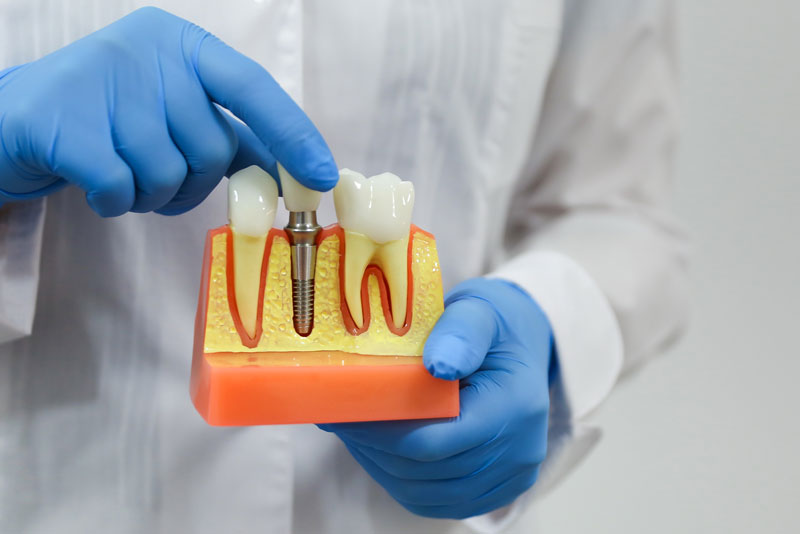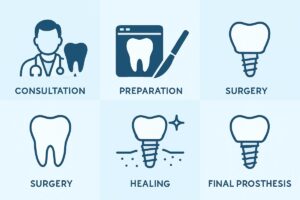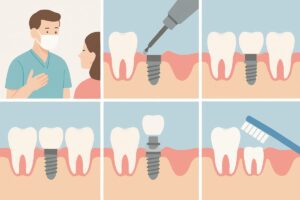If you’re searching for a “dentist who do implants near me“, this guide will help you know what to ask and what matters. It’s written for people who are ready to replace missing teeth or who are comparing offices and treatment plans. Expect an easy-to-read overview and practical next steps — a roughly 8-minute read with clear questions to bring to your consultation.
How dental implants work — the basics
Dental implants replace missing teeth with three main parts: the implant fixture (a titanium post placed in the jaw), the abutment (connects the post to the tooth), and the crown or prosthesis (the visible tooth or full-arch restoration). Treatment usually follows a predictable path: consultation and exam, a CBCT scan or digital imaging, surgical placement of the implant, a healing period for bone to integrate, and a final restoration once healing is complete.
Typical timelines vary. A single-tooth implant often takes 3–6 months from start to finish. Full-arch protocols can be faster when same-day provisional teeth are used, but final restorations may still take several weeks. Modern implants have high success rates — commonly above 95% when placed by trained clinicians with good planning and follow-up.
Key qualifications and tech to look for in a dentist who does implants near me
Training & experience
Look for post-graduate training in implantology or oral surgery, residency experience, and membership in recognized implant organizations. High case volume matters: clinicians who place many implants build judgment and handle complications more predictably. Ask about specific courses, residency, or fellowship training and how many similar cases the dentist performs yearly.
Imaging & digital planning
3D imaging (CBCT scans), digital implant planning, and guided surgery help ensure implants are placed where bone and soft tissue support long-term success. Ask whether the office uses digital scans, guided surgical guides, and software to plan implant position before surgery — these tools reduce surprises and improve prosthetic outcomes.
Team and care continuity
Complex implant care benefits from a coordinated team: surgical clinicians, restorative dentists, and lab technicians working together. Continuity of care — from initial plan to final restoration and ongoing maintenance — lowers the chance of handoff errors and improves long-term results.
Important questions to ask at your consultation
- What are your success and complication rates for cases like mine?
- What is the expected timeline and number of follow-up visits?
- Which implant and prosthesis brands do you use, and why?
- Do you provide a written warranty or maintenance plan?
- What are payment and financing options, and do you offer phased treatment?
- Can I see before/after photos or speak with past patients?
Why having an in-house lab matters for implant outcomes
An on-site dental lab that designs and mills restorations in-house offers major benefits. Faster turnaround means fewer appointments and quicker provisional or final teeth. Tighter communication between the dentist and lab tech reduces misfits and remakes because adjustments can be made immediately.
In-house milling and 3D printing give better control over fit, shade matching, and material choice (zirconia or acrylic). When the lab is under the same roof, the team can trial-fit, tweak, and deliver a prosthesis the same day or within a short window — helping with scheduling, comfort, and overall quality.
Red flags when searching for a dentist who do implants near me
- Rushed consultations that skip exams or imaging.
- No 3D imaging or digital planning for complex cases.
- Vague or no written treatment plan, timeline, or follow-up schedule.
- Unrealistically low “one-price-fits-all” offers with no explanation of materials or warranty.
- Inability to show case photos or explain how complications are handled.
How to choose the right provider and what to expect if you move forward
Compare estimates, read verified reviews, and request before/after photos for cases like yours. Ask for a clear, written treatment plan and a cost breakdown that separates surgical fees, implant hardware, and prosthetic costs. Get details on follow-up visits and maintenance.
At your first visit you should expect a full exam, a CBCT or digital scan, a proposed treatment plan with alternatives, a cost estimate, and a discussion about risks and consent. A good office will explain maintenance and emergency contact procedures.
Touchstone Dental Implant Center operates a fully functioning in-house lab with on-site milling and 3D printing. That vertical model allows same-day provisional teeth, tighter fit control, fewer remakes, and clearer scheduling for patients. The practice also offers advanced options like LAPIP™ for failing implants, broad sedation choices, and a documented warranty and maintenance program — all designed to reduce risk and improve long-term outcomes.
If you want a focused evaluation, book a consultation to review imaging and get a personalized plan. Bring your list of questions from this guide and any prior dental records — a good consultation will leave you informed and ready to decide.






